Literature Review: Negative Effects of Social Media on Well-being
VerifiedAdded on 2023/03/23
|8
|2302
|21
Literature Review
AI Summary
This literature review critically evaluates the negative impacts of social media use on subjective well-being. It explores how social media platforms influence decision-making capabilities, cognitive thinking skills, and overall quality of life. The review highlights the tendency for individuals to compare themselves to others on social media, leading to negative effects on their subjective well-being. It examines the role of social media in spreading fake news and its impact on cognitive judgment. The review also discusses how multimedia content, especially videos, can influence psychological behavior, particularly among teenagers who often compare their lives to those portrayed on social media. Furthermore, the literature explores how engagement in online relationships and the pursuit of likes and comments can affect social behavior and mental state. The review references the Five-Factor Model (FFM) and Reinforcement Sensitivity Theory (RST) for analyzing personality and subjective well-being in the context of social media use. It concludes that social media has a profound impact on the quality of life, with the degree of influence depending on how individuals perceive and engage with these platforms.

PSYCHOLOGY
Paraphrase This Document
Need a fresh take? Get an instant paraphrase of this document with our AI Paraphraser
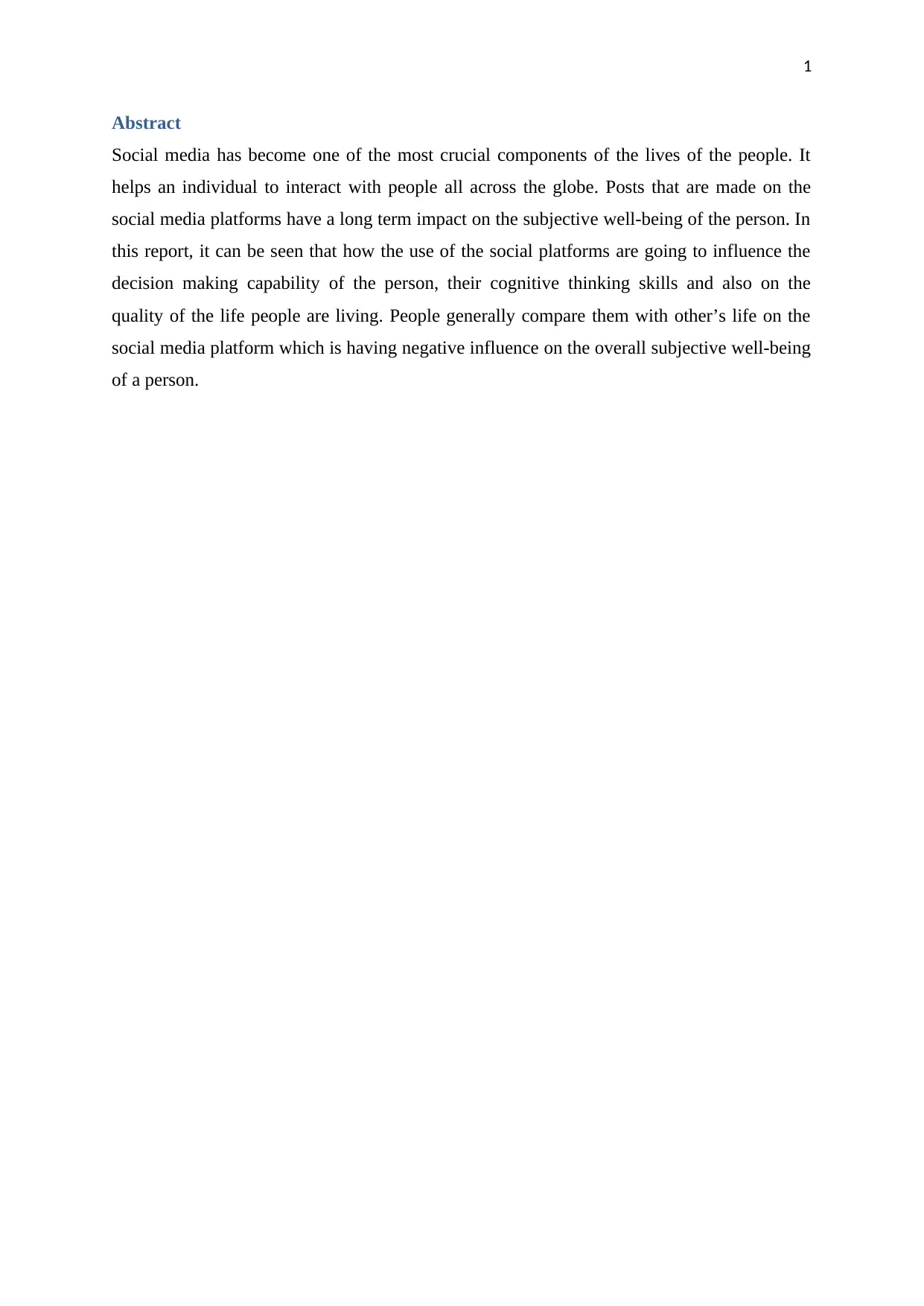
1
Abstract
Social media has become one of the most crucial components of the lives of the people. It
helps an individual to interact with people all across the globe. Posts that are made on the
social media platforms have a long term impact on the subjective well-being of the person. In
this report, it can be seen that how the use of the social platforms are going to influence the
decision making capability of the person, their cognitive thinking skills and also on the
quality of the life people are living. People generally compare them with other’s life on the
social media platform which is having negative influence on the overall subjective well-being
of a person.
Abstract
Social media has become one of the most crucial components of the lives of the people. It
helps an individual to interact with people all across the globe. Posts that are made on the
social media platforms have a long term impact on the subjective well-being of the person. In
this report, it can be seen that how the use of the social platforms are going to influence the
decision making capability of the person, their cognitive thinking skills and also on the
quality of the life people are living. People generally compare them with other’s life on the
social media platform which is having negative influence on the overall subjective well-being
of a person.
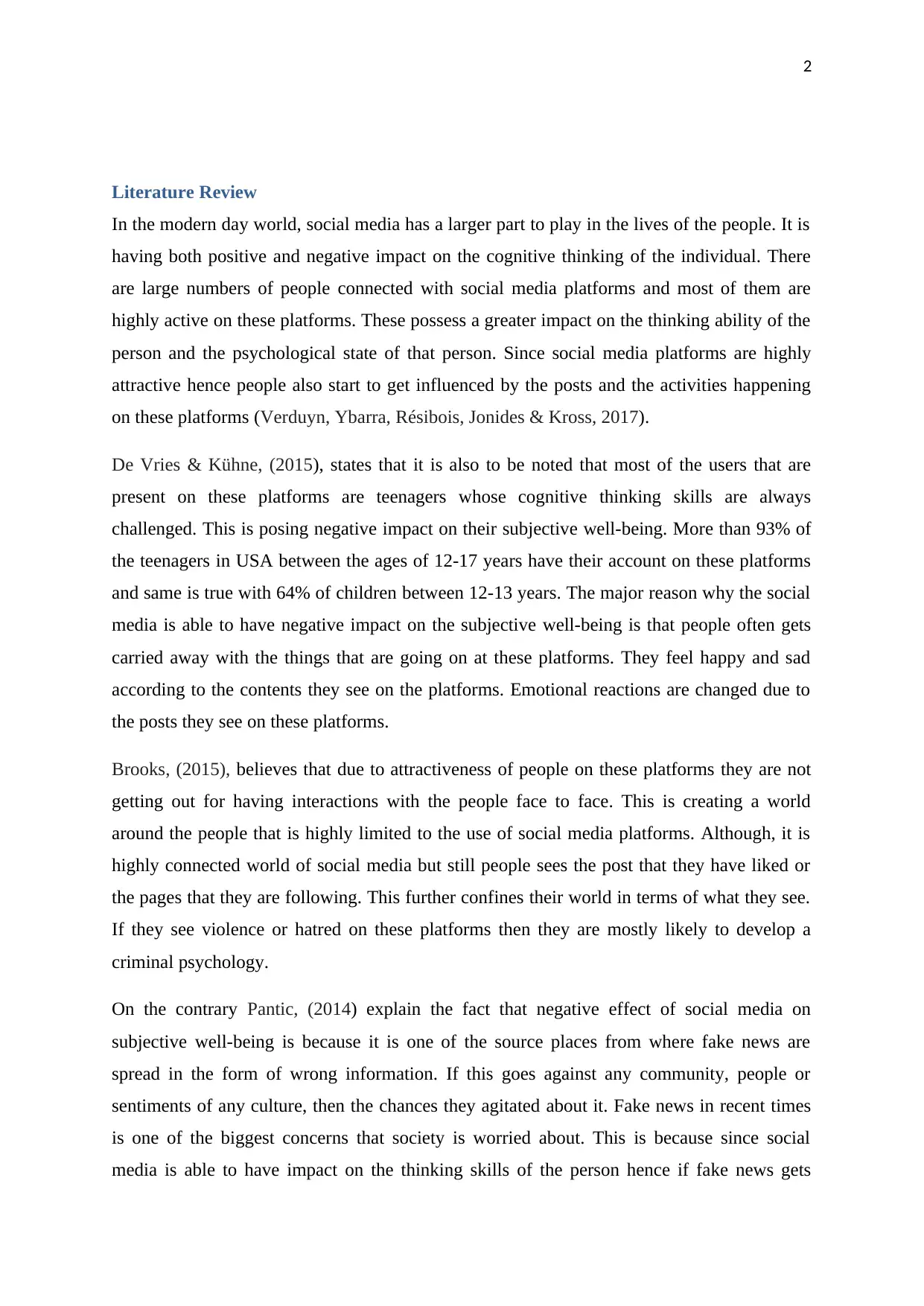
2
Literature Review
In the modern day world, social media has a larger part to play in the lives of the people. It is
having both positive and negative impact on the cognitive thinking of the individual. There
are large numbers of people connected with social media platforms and most of them are
highly active on these platforms. These possess a greater impact on the thinking ability of the
person and the psychological state of that person. Since social media platforms are highly
attractive hence people also start to get influenced by the posts and the activities happening
on these platforms (Verduyn, Ybarra, Résibois, Jonides & Kross, 2017).
De Vries & Kühne, (2015), states that it is also to be noted that most of the users that are
present on these platforms are teenagers whose cognitive thinking skills are always
challenged. This is posing negative impact on their subjective well-being. More than 93% of
the teenagers in USA between the ages of 12-17 years have their account on these platforms
and same is true with 64% of children between 12-13 years. The major reason why the social
media is able to have negative impact on the subjective well-being is that people often gets
carried away with the things that are going on at these platforms. They feel happy and sad
according to the contents they see on the platforms. Emotional reactions are changed due to
the posts they see on these platforms.
Brooks, (2015), believes that due to attractiveness of people on these platforms they are not
getting out for having interactions with the people face to face. This is creating a world
around the people that is highly limited to the use of social media platforms. Although, it is
highly connected world of social media but still people sees the post that they have liked or
the pages that they are following. This further confines their world in terms of what they see.
If they see violence or hatred on these platforms then they are mostly likely to develop a
criminal psychology.
On the contrary Pantic, (2014) explain the fact that negative effect of social media on
subjective well-being is because it is one of the source places from where fake news are
spread in the form of wrong information. If this goes against any community, people or
sentiments of any culture, then the chances they agitated about it. Fake news in recent times
is one of the biggest concerns that society is worried about. This is because since social
media is able to have impact on the thinking skills of the person hence if fake news gets
Literature Review
In the modern day world, social media has a larger part to play in the lives of the people. It is
having both positive and negative impact on the cognitive thinking of the individual. There
are large numbers of people connected with social media platforms and most of them are
highly active on these platforms. These possess a greater impact on the thinking ability of the
person and the psychological state of that person. Since social media platforms are highly
attractive hence people also start to get influenced by the posts and the activities happening
on these platforms (Verduyn, Ybarra, Résibois, Jonides & Kross, 2017).
De Vries & Kühne, (2015), states that it is also to be noted that most of the users that are
present on these platforms are teenagers whose cognitive thinking skills are always
challenged. This is posing negative impact on their subjective well-being. More than 93% of
the teenagers in USA between the ages of 12-17 years have their account on these platforms
and same is true with 64% of children between 12-13 years. The major reason why the social
media is able to have negative impact on the subjective well-being is that people often gets
carried away with the things that are going on at these platforms. They feel happy and sad
according to the contents they see on the platforms. Emotional reactions are changed due to
the posts they see on these platforms.
Brooks, (2015), believes that due to attractiveness of people on these platforms they are not
getting out for having interactions with the people face to face. This is creating a world
around the people that is highly limited to the use of social media platforms. Although, it is
highly connected world of social media but still people sees the post that they have liked or
the pages that they are following. This further confines their world in terms of what they see.
If they see violence or hatred on these platforms then they are mostly likely to develop a
criminal psychology.
On the contrary Pantic, (2014) explain the fact that negative effect of social media on
subjective well-being is because it is one of the source places from where fake news are
spread in the form of wrong information. If this goes against any community, people or
sentiments of any culture, then the chances they agitated about it. Fake news in recent times
is one of the biggest concerns that society is worried about. This is because since social
media is able to have impact on the thinking skills of the person hence if fake news gets
⊘ This is a preview!⊘
Do you want full access?
Subscribe today to unlock all pages.

Trusted by 1+ million students worldwide
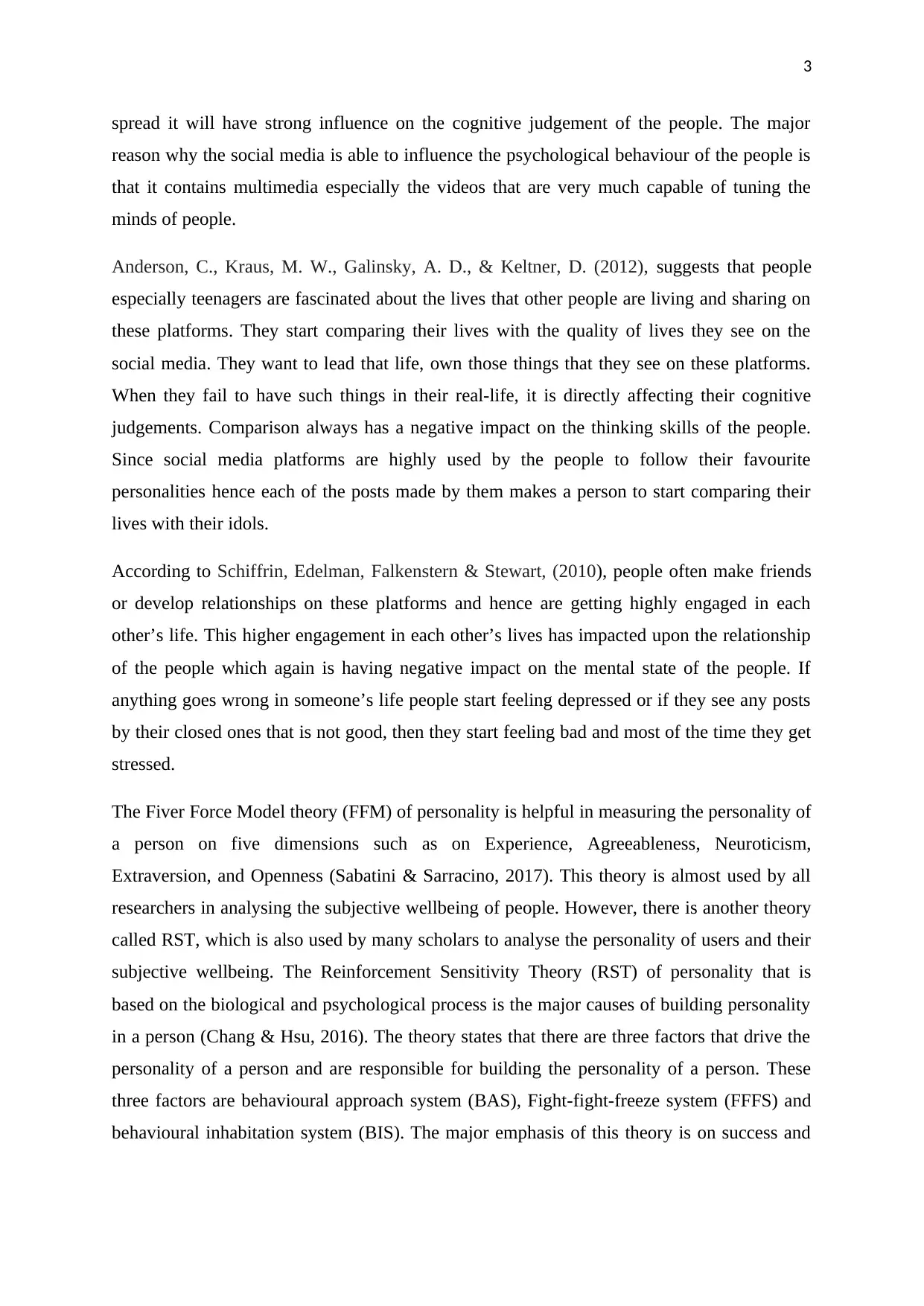
3
spread it will have strong influence on the cognitive judgement of the people. The major
reason why the social media is able to influence the psychological behaviour of the people is
that it contains multimedia especially the videos that are very much capable of tuning the
minds of people.
Anderson, C., Kraus, M. W., Galinsky, A. D., & Keltner, D. (2012), suggests that people
especially teenagers are fascinated about the lives that other people are living and sharing on
these platforms. They start comparing their lives with the quality of lives they see on the
social media. They want to lead that life, own those things that they see on these platforms.
When they fail to have such things in their real-life, it is directly affecting their cognitive
judgements. Comparison always has a negative impact on the thinking skills of the people.
Since social media platforms are highly used by the people to follow their favourite
personalities hence each of the posts made by them makes a person to start comparing their
lives with their idols.
According to Schiffrin, Edelman, Falkenstern & Stewart, (2010), people often make friends
or develop relationships on these platforms and hence are getting highly engaged in each
other’s life. This higher engagement in each other’s lives has impacted upon the relationship
of the people which again is having negative impact on the mental state of the people. If
anything goes wrong in someone’s life people start feeling depressed or if they see any posts
by their closed ones that is not good, then they start feeling bad and most of the time they get
stressed.
The Fiver Force Model theory (FFM) of personality is helpful in measuring the personality of
a person on five dimensions such as on Experience, Agreeableness, Neuroticism,
Extraversion, and Openness (Sabatini & Sarracino, 2017). This theory is almost used by all
researchers in analysing the subjective wellbeing of people. However, there is another theory
called RST, which is also used by many scholars to analyse the personality of users and their
subjective wellbeing. The Reinforcement Sensitivity Theory (RST) of personality that is
based on the biological and psychological process is the major causes of building personality
in a person (Chang & Hsu, 2016). The theory states that there are three factors that drive the
personality of a person and are responsible for building the personality of a person. These
three factors are behavioural approach system (BAS), Fight-fight-freeze system (FFFS) and
behavioural inhabitation system (BIS). The major emphasis of this theory is on success and
spread it will have strong influence on the cognitive judgement of the people. The major
reason why the social media is able to influence the psychological behaviour of the people is
that it contains multimedia especially the videos that are very much capable of tuning the
minds of people.
Anderson, C., Kraus, M. W., Galinsky, A. D., & Keltner, D. (2012), suggests that people
especially teenagers are fascinated about the lives that other people are living and sharing on
these platforms. They start comparing their lives with the quality of lives they see on the
social media. They want to lead that life, own those things that they see on these platforms.
When they fail to have such things in their real-life, it is directly affecting their cognitive
judgements. Comparison always has a negative impact on the thinking skills of the people.
Since social media platforms are highly used by the people to follow their favourite
personalities hence each of the posts made by them makes a person to start comparing their
lives with their idols.
According to Schiffrin, Edelman, Falkenstern & Stewart, (2010), people often make friends
or develop relationships on these platforms and hence are getting highly engaged in each
other’s life. This higher engagement in each other’s lives has impacted upon the relationship
of the people which again is having negative impact on the mental state of the people. If
anything goes wrong in someone’s life people start feeling depressed or if they see any posts
by their closed ones that is not good, then they start feeling bad and most of the time they get
stressed.
The Fiver Force Model theory (FFM) of personality is helpful in measuring the personality of
a person on five dimensions such as on Experience, Agreeableness, Neuroticism,
Extraversion, and Openness (Sabatini & Sarracino, 2017). This theory is almost used by all
researchers in analysing the subjective wellbeing of people. However, there is another theory
called RST, which is also used by many scholars to analyse the personality of users and their
subjective wellbeing. The Reinforcement Sensitivity Theory (RST) of personality that is
based on the biological and psychological process is the major causes of building personality
in a person (Chang & Hsu, 2016). The theory states that there are three factors that drive the
personality of a person and are responsible for building the personality of a person. These
three factors are behavioural approach system (BAS), Fight-fight-freeze system (FFFS) and
behavioural inhabitation system (BIS). The major emphasis of this theory is on success and
Paraphrase This Document
Need a fresh take? Get an instant paraphrase of this document with our AI Paraphraser
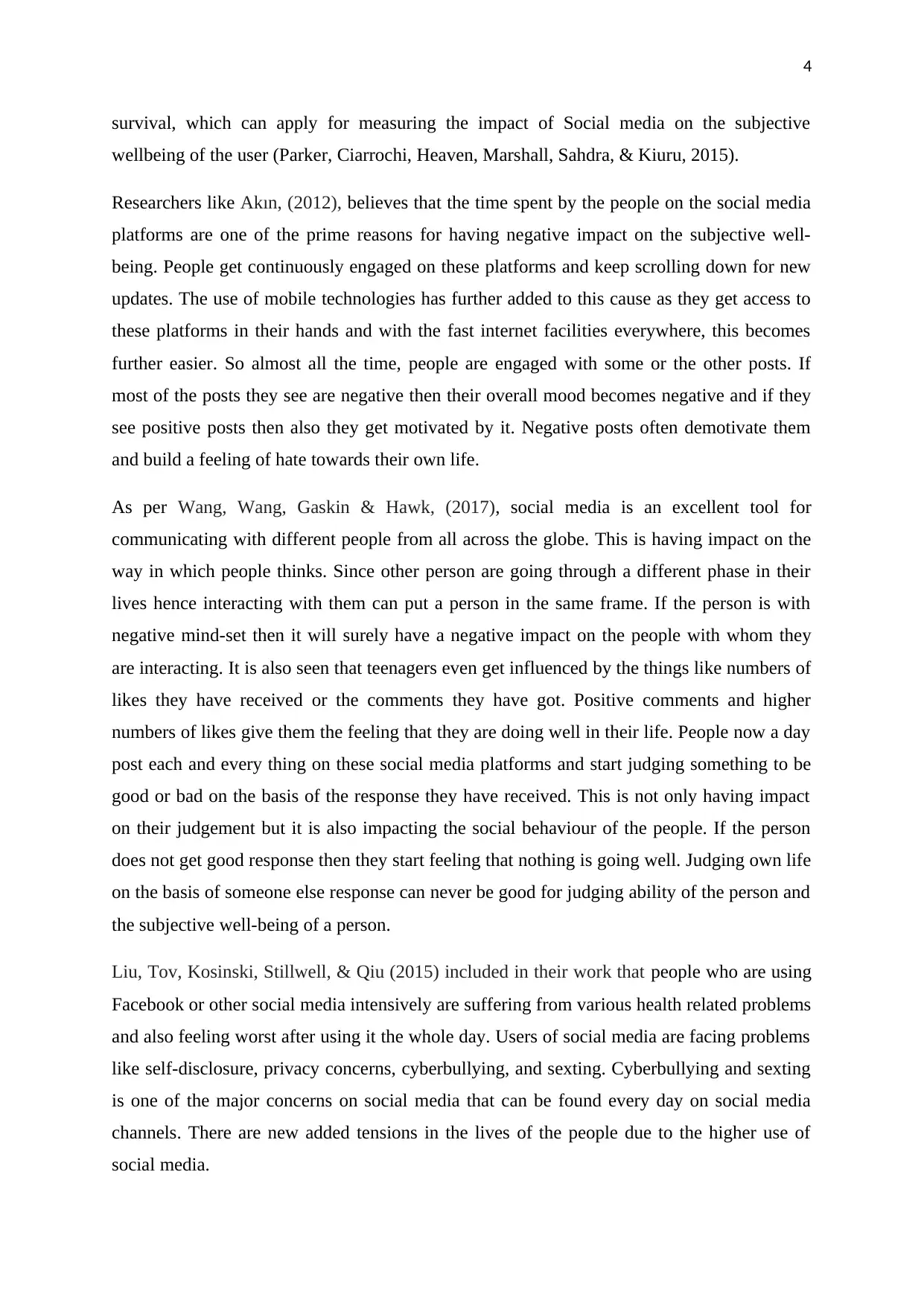
4
survival, which can apply for measuring the impact of Social media on the subjective
wellbeing of the user (Parker, Ciarrochi, Heaven, Marshall, Sahdra, & Kiuru, 2015).
Researchers like Akın, (2012), believes that the time spent by the people on the social media
platforms are one of the prime reasons for having negative impact on the subjective well-
being. People get continuously engaged on these platforms and keep scrolling down for new
updates. The use of mobile technologies has further added to this cause as they get access to
these platforms in their hands and with the fast internet facilities everywhere, this becomes
further easier. So almost all the time, people are engaged with some or the other posts. If
most of the posts they see are negative then their overall mood becomes negative and if they
see positive posts then also they get motivated by it. Negative posts often demotivate them
and build a feeling of hate towards their own life.
As per Wang, Wang, Gaskin & Hawk, (2017), social media is an excellent tool for
communicating with different people from all across the globe. This is having impact on the
way in which people thinks. Since other person are going through a different phase in their
lives hence interacting with them can put a person in the same frame. If the person is with
negative mind-set then it will surely have a negative impact on the people with whom they
are interacting. It is also seen that teenagers even get influenced by the things like numbers of
likes they have received or the comments they have got. Positive comments and higher
numbers of likes give them the feeling that they are doing well in their life. People now a day
post each and every thing on these social media platforms and start judging something to be
good or bad on the basis of the response they have received. This is not only having impact
on their judgement but it is also impacting the social behaviour of the people. If the person
does not get good response then they start feeling that nothing is going well. Judging own life
on the basis of someone else response can never be good for judging ability of the person and
the subjective well-being of a person.
Liu, Tov, Kosinski, Stillwell, & Qiu (2015) included in their work that people who are using
Facebook or other social media intensively are suffering from various health related problems
and also feeling worst after using it the whole day. Users of social media are facing problems
like self-disclosure, privacy concerns, cyberbullying, and sexting. Cyberbullying and sexting
is one of the major concerns on social media that can be found every day on social media
channels. There are new added tensions in the lives of the people due to the higher use of
social media.
survival, which can apply for measuring the impact of Social media on the subjective
wellbeing of the user (Parker, Ciarrochi, Heaven, Marshall, Sahdra, & Kiuru, 2015).
Researchers like Akın, (2012), believes that the time spent by the people on the social media
platforms are one of the prime reasons for having negative impact on the subjective well-
being. People get continuously engaged on these platforms and keep scrolling down for new
updates. The use of mobile technologies has further added to this cause as they get access to
these platforms in their hands and with the fast internet facilities everywhere, this becomes
further easier. So almost all the time, people are engaged with some or the other posts. If
most of the posts they see are negative then their overall mood becomes negative and if they
see positive posts then also they get motivated by it. Negative posts often demotivate them
and build a feeling of hate towards their own life.
As per Wang, Wang, Gaskin & Hawk, (2017), social media is an excellent tool for
communicating with different people from all across the globe. This is having impact on the
way in which people thinks. Since other person are going through a different phase in their
lives hence interacting with them can put a person in the same frame. If the person is with
negative mind-set then it will surely have a negative impact on the people with whom they
are interacting. It is also seen that teenagers even get influenced by the things like numbers of
likes they have received or the comments they have got. Positive comments and higher
numbers of likes give them the feeling that they are doing well in their life. People now a day
post each and every thing on these social media platforms and start judging something to be
good or bad on the basis of the response they have received. This is not only having impact
on their judgement but it is also impacting the social behaviour of the people. If the person
does not get good response then they start feeling that nothing is going well. Judging own life
on the basis of someone else response can never be good for judging ability of the person and
the subjective well-being of a person.
Liu, Tov, Kosinski, Stillwell, & Qiu (2015) included in their work that people who are using
Facebook or other social media intensively are suffering from various health related problems
and also feeling worst after using it the whole day. Users of social media are facing problems
like self-disclosure, privacy concerns, cyberbullying, and sexting. Cyberbullying and sexting
is one of the major concerns on social media that can be found every day on social media
channels. There are new added tensions in the lives of the people due to the higher use of
social media.
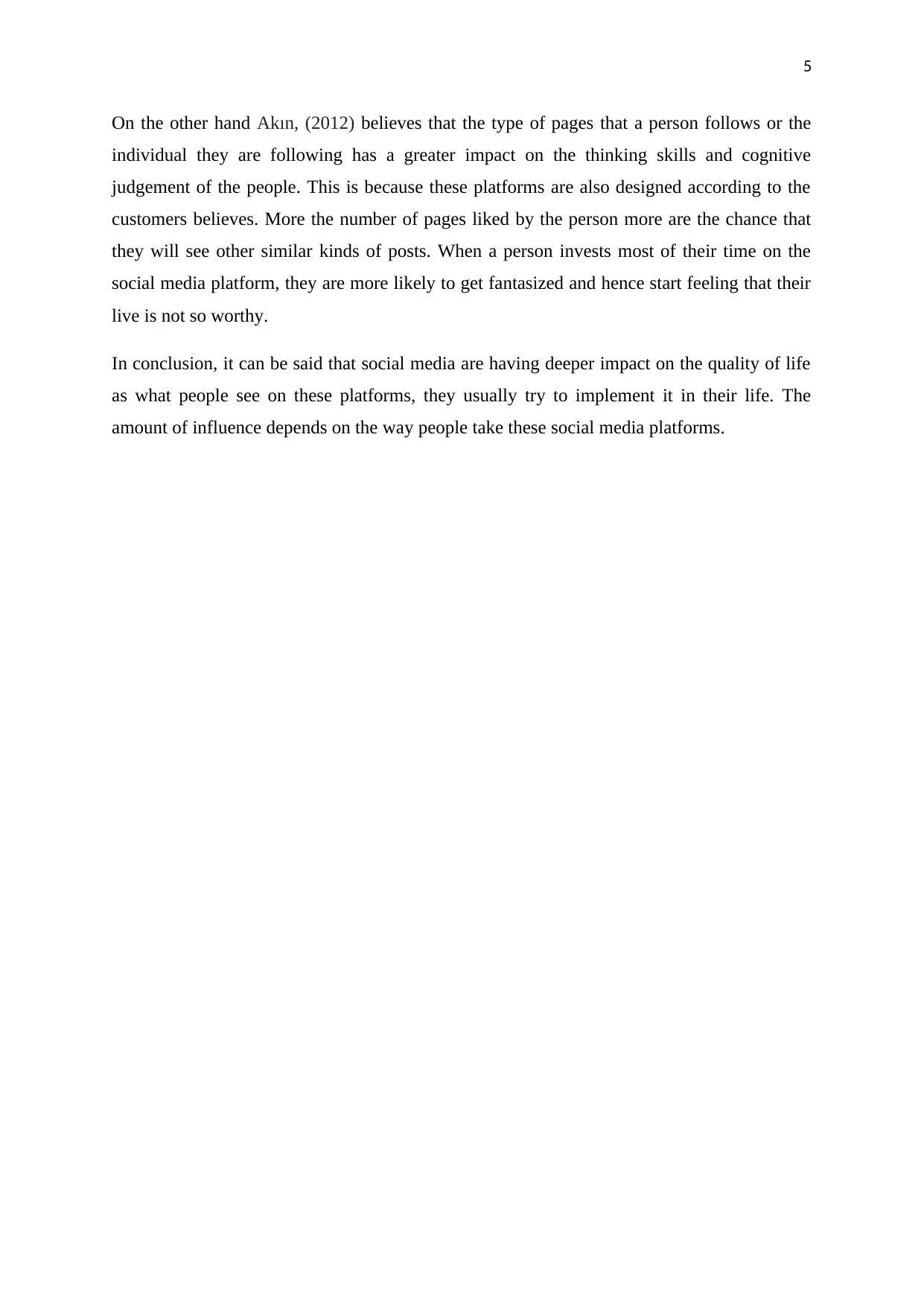
5
On the other hand Akın, (2012) believes that the type of pages that a person follows or the
individual they are following has a greater impact on the thinking skills and cognitive
judgement of the people. This is because these platforms are also designed according to the
customers believes. More the number of pages liked by the person more are the chance that
they will see other similar kinds of posts. When a person invests most of their time on the
social media platform, they are more likely to get fantasized and hence start feeling that their
live is not so worthy.
In conclusion, it can be said that social media are having deeper impact on the quality of life
as what people see on these platforms, they usually try to implement it in their life. The
amount of influence depends on the way people take these social media platforms.
On the other hand Akın, (2012) believes that the type of pages that a person follows or the
individual they are following has a greater impact on the thinking skills and cognitive
judgement of the people. This is because these platforms are also designed according to the
customers believes. More the number of pages liked by the person more are the chance that
they will see other similar kinds of posts. When a person invests most of their time on the
social media platform, they are more likely to get fantasized and hence start feeling that their
live is not so worthy.
In conclusion, it can be said that social media are having deeper impact on the quality of life
as what people see on these platforms, they usually try to implement it in their life. The
amount of influence depends on the way people take these social media platforms.
⊘ This is a preview!⊘
Do you want full access?
Subscribe today to unlock all pages.

Trusted by 1+ million students worldwide
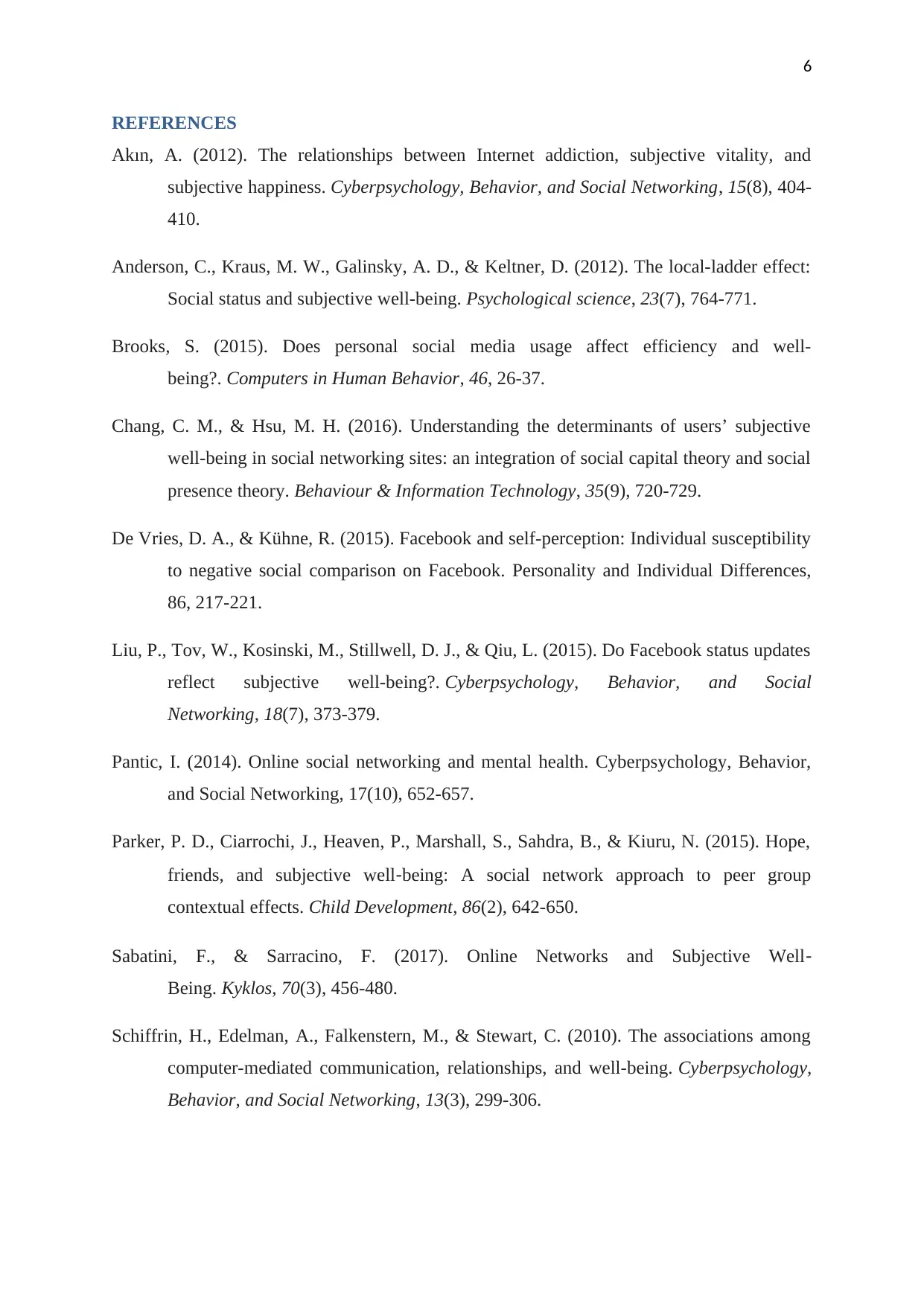
6
REFERENCES
Akın, A. (2012). The relationships between Internet addiction, subjective vitality, and
subjective happiness. Cyberpsychology, Behavior, and Social Networking, 15(8), 404-
410.
Anderson, C., Kraus, M. W., Galinsky, A. D., & Keltner, D. (2012). The local-ladder effect:
Social status and subjective well-being. Psychological science, 23(7), 764-771.
Brooks, S. (2015). Does personal social media usage affect efficiency and well-
being?. Computers in Human Behavior, 46, 26-37.
Chang, C. M., & Hsu, M. H. (2016). Understanding the determinants of users’ subjective
well-being in social networking sites: an integration of social capital theory and social
presence theory. Behaviour & Information Technology, 35(9), 720-729.
De Vries, D. A., & Kühne, R. (2015). Facebook and self-perception: Individual susceptibility
to negative social comparison on Facebook. Personality and Individual Differences,
86, 217-221.
Liu, P., Tov, W., Kosinski, M., Stillwell, D. J., & Qiu, L. (2015). Do Facebook status updates
reflect subjective well-being?. Cyberpsychology, Behavior, and Social
Networking, 18(7), 373-379.
Pantic, I. (2014). Online social networking and mental health. Cyberpsychology, Behavior,
and Social Networking, 17(10), 652-657.
Parker, P. D., Ciarrochi, J., Heaven, P., Marshall, S., Sahdra, B., & Kiuru, N. (2015). Hope,
friends, and subjective well‐being: A social network approach to peer group
contextual effects. Child Development, 86(2), 642-650.
Sabatini, F., & Sarracino, F. (2017). Online Networks and Subjective Well‐
Being. Kyklos, 70(3), 456-480.
Schiffrin, H., Edelman, A., Falkenstern, M., & Stewart, C. (2010). The associations among
computer-mediated communication, relationships, and well-being. Cyberpsychology,
Behavior, and Social Networking, 13(3), 299-306.
REFERENCES
Akın, A. (2012). The relationships between Internet addiction, subjective vitality, and
subjective happiness. Cyberpsychology, Behavior, and Social Networking, 15(8), 404-
410.
Anderson, C., Kraus, M. W., Galinsky, A. D., & Keltner, D. (2012). The local-ladder effect:
Social status and subjective well-being. Psychological science, 23(7), 764-771.
Brooks, S. (2015). Does personal social media usage affect efficiency and well-
being?. Computers in Human Behavior, 46, 26-37.
Chang, C. M., & Hsu, M. H. (2016). Understanding the determinants of users’ subjective
well-being in social networking sites: an integration of social capital theory and social
presence theory. Behaviour & Information Technology, 35(9), 720-729.
De Vries, D. A., & Kühne, R. (2015). Facebook and self-perception: Individual susceptibility
to negative social comparison on Facebook. Personality and Individual Differences,
86, 217-221.
Liu, P., Tov, W., Kosinski, M., Stillwell, D. J., & Qiu, L. (2015). Do Facebook status updates
reflect subjective well-being?. Cyberpsychology, Behavior, and Social
Networking, 18(7), 373-379.
Pantic, I. (2014). Online social networking and mental health. Cyberpsychology, Behavior,
and Social Networking, 17(10), 652-657.
Parker, P. D., Ciarrochi, J., Heaven, P., Marshall, S., Sahdra, B., & Kiuru, N. (2015). Hope,
friends, and subjective well‐being: A social network approach to peer group
contextual effects. Child Development, 86(2), 642-650.
Sabatini, F., & Sarracino, F. (2017). Online Networks and Subjective Well‐
Being. Kyklos, 70(3), 456-480.
Schiffrin, H., Edelman, A., Falkenstern, M., & Stewart, C. (2010). The associations among
computer-mediated communication, relationships, and well-being. Cyberpsychology,
Behavior, and Social Networking, 13(3), 299-306.
Paraphrase This Document
Need a fresh take? Get an instant paraphrase of this document with our AI Paraphraser
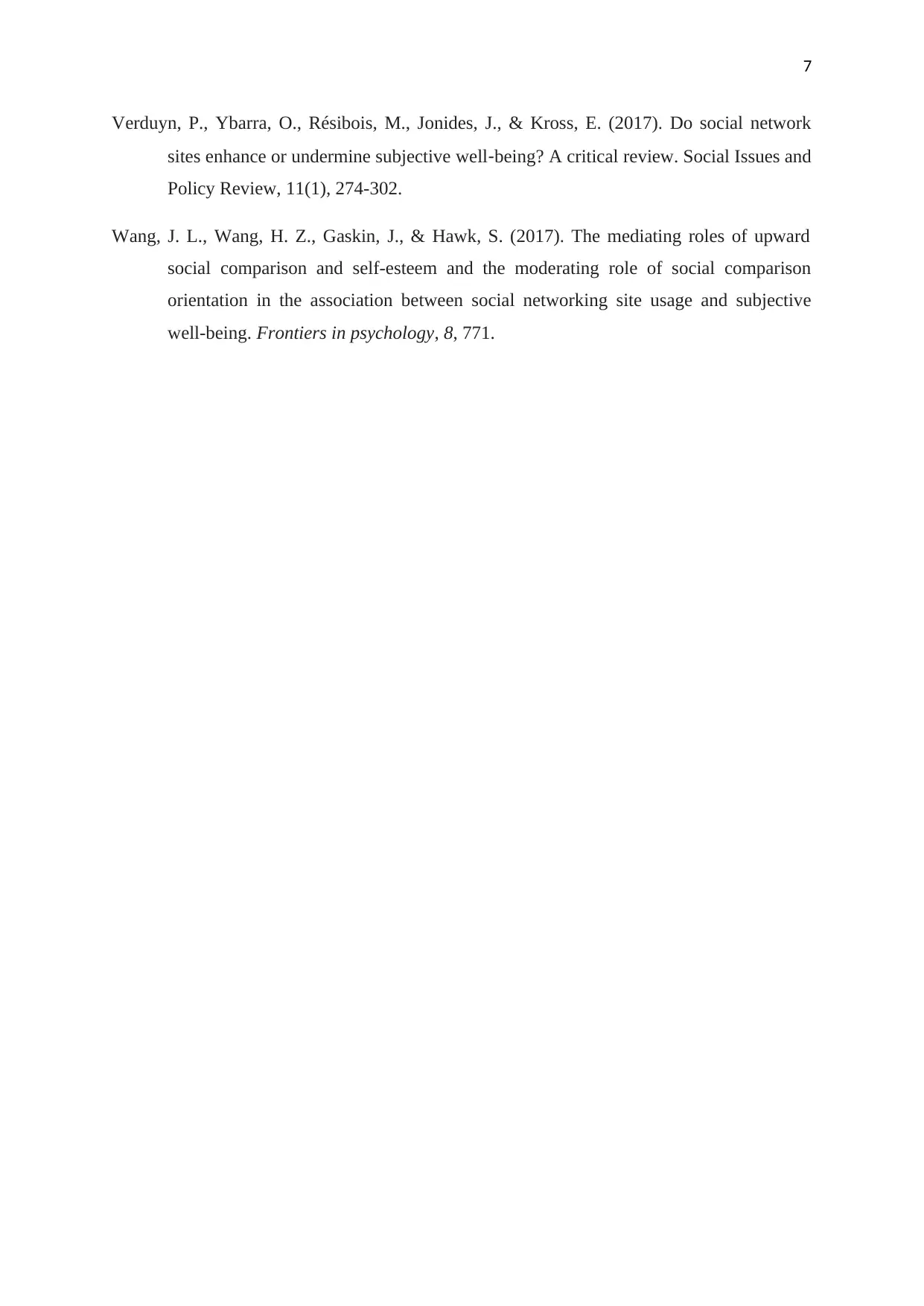
7
Verduyn, P., Ybarra, O., Résibois, M., Jonides, J., & Kross, E. (2017). Do social network
sites enhance or undermine subjective well‐being? A critical review. Social Issues and
Policy Review, 11(1), 274-302.
Wang, J. L., Wang, H. Z., Gaskin, J., & Hawk, S. (2017). The mediating roles of upward
social comparison and self-esteem and the moderating role of social comparison
orientation in the association between social networking site usage and subjective
well-being. Frontiers in psychology, 8, 771.
Verduyn, P., Ybarra, O., Résibois, M., Jonides, J., & Kross, E. (2017). Do social network
sites enhance or undermine subjective well‐being? A critical review. Social Issues and
Policy Review, 11(1), 274-302.
Wang, J. L., Wang, H. Z., Gaskin, J., & Hawk, S. (2017). The mediating roles of upward
social comparison and self-esteem and the moderating role of social comparison
orientation in the association between social networking site usage and subjective
well-being. Frontiers in psychology, 8, 771.
1 out of 8
Related Documents
Your All-in-One AI-Powered Toolkit for Academic Success.
+13062052269
info@desklib.com
Available 24*7 on WhatsApp / Email
![[object Object]](/_next/static/media/star-bottom.7253800d.svg)
Unlock your academic potential
Copyright © 2020–2025 A2Z Services. All Rights Reserved. Developed and managed by ZUCOL.




